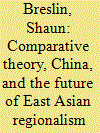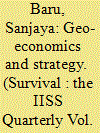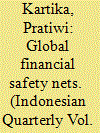| Srl | Item |
| 1 |
ID:
129944


|
|
|
|
|
| Publication |
2014.
|
| Summary/Abstract |
The Greek election of May 2012 failed to produce a government, resulting in repeat elections six weeks later. This shock outcome was a symptom of a broader delegitimation of the national political system. Over the past decade Eurobarometer data show a much more extensive loss of confidence in political institutions in Greece than in the European Union as a whole. In a first phase, rising political discontent was managed within the traditional political framework through alternation in power between the two major parties. In contrast, the second phase, following the outbreak of the Greek sovereign debt crisis, led to the dramatic fragmentation of the party system and changed the mode of government formation. This process is not reversible and entails serious democratic dangers.
|
|
|
|
|
|
|
|
|
|
|
|
|
|
|
|
| 2 |
ID:
097921


|
|
|
|
|
| Publication |
2010.
|
| Summary/Abstract |
Despite the development of an increasingly sophisticated literature on comparative regional integration drawing from a variety of cases, the European experience remains the most often used benchmark against which other integrative processes are judged; there is still an often implicit expectation that 'successful' processes of regionalism will end up looking something like the European Union. While it is correct to move away from such a 'Euro-dominance', the theoretical lessons learned continue to have salience when applied to emerging and competing forms of integrative processes in East Asia. In particular, when economic considerations dominate regional relations - at times of economic crises - then integrative logics and strategies come to the fore. In more 'normal' times when geo-strategic considerations reassert themselves, then the consensus over region building and the very nature of the region itself is weakened and cooperation is replaced by competing visions and the over-supply of region.
|
|
|
|
|
|
|
|
|
|
|
|
|
|
|
|
| 3 |
ID:
118160


|
|
|
|
|
| Publication |
2012.
|
| Summary/Abstract |
A central argument in the literature on economic crises and policy reform is that currency crises lead governments to liberalize their capital accounts in order to establish their credibility to international markets. I argue that the reverse is true: currency crises lead governments to restrict capital flows as a form of self-help. Using instrumental variables to account for the possibility that capital account liberalization causes currency crises, I show that currency crises are robustly associated with capital account closure across developing countries. The findings refocus the debate on currency crises and capital account liberalization and contribute to larger debates about the role of critical junctures in prompting neoliberal policy reform.
|
|
|
|
|
|
|
|
|
|
|
|
|
|
|
|
| 4 |
ID:
113157


|
|
|
|
|
| Publication |
2012.
|
| Summary/Abstract |
Geo-economics may be defined in two different ways: as the relationship between economic policy and changes in national power and geopolitics (in other words, the geopolitical consequences of economic phenomena); or as the economic consequences of trends in geopolitics and national power. Both the notion that 'trade follows the flag' (that the projection of national power has economic consequences) and that 'the flag follows trade' (that there are geopolitical consequences of essentially economic phenomena) point to the subject matter of geo-economics.
|
|
|
|
|
|
|
|
|
|
|
|
|
|
|
|
| 5 |
ID:
113389


|
|
|
| 6 |
ID:
115932


|
|
|
| 7 |
ID:
097754


|
|
|
|
|
| Publication |
2010.
|
| Summary/Abstract |
Speculation about the future of the North Korean regime has been intense for nearly two decades. In the 1990s, economic crises and famine led to predictions of the Kim regime's imminent downfall. Today analysts highlight impending famine as well as threats to the regime's position brought by eroding information control. Several theories of authoritarian control help to explain how Kim Jong-il and his family have remained in power and how this might change over time. The Kim regime has employed a variety of authoritarian "tools" to protect itself both from popular revolt and from internal coups. Its social policies, reliance on certain ideas and nationalism, and use of force prevent the onset of revolution. Through numerous other tools (elite co-optation, manipulation of foreign governments for financial aid, and the "coupproofing" of domestic institutions), the regime protects itself from coups d'état and elite unrest. This framework not only helps to explain the past resilience of the regime, but it suggests that the regime is not in danger of being unseated by coups or revolution. Yet it also suggests that the regime has not adequately prepared for succession after Kim's death. This analysis has implications for policy planning about the future of the Korean Peninsula, as well as for negotiations with and coercive strategies toward Pyongyang.
|
|
|
|
|
|
|
|
|
|
|
|
|
|
|
|